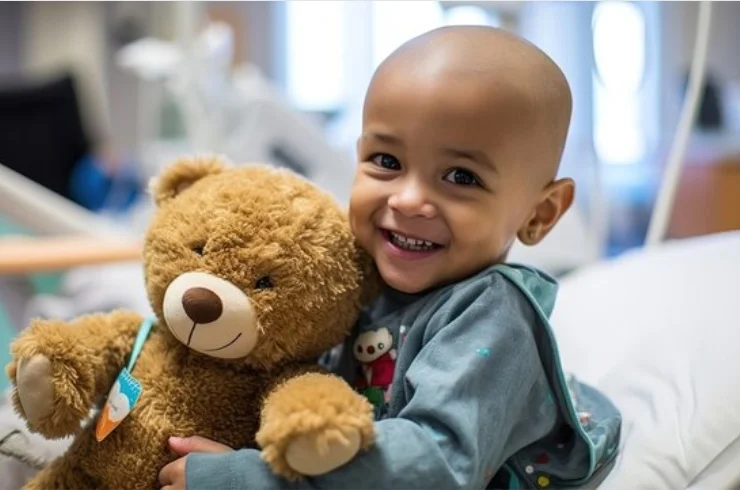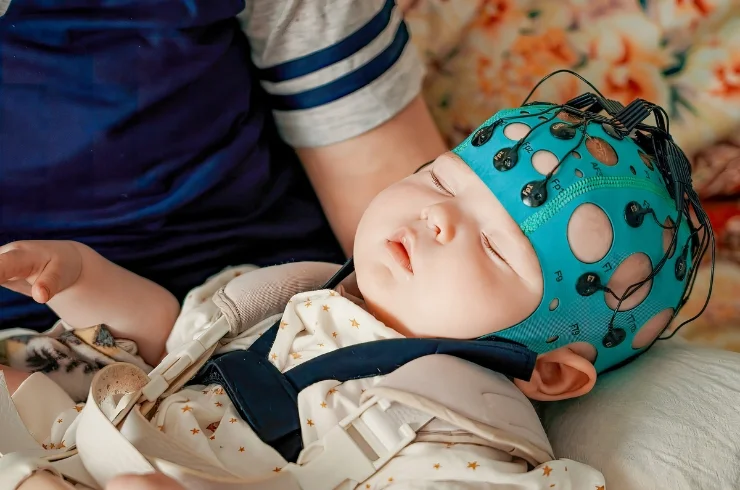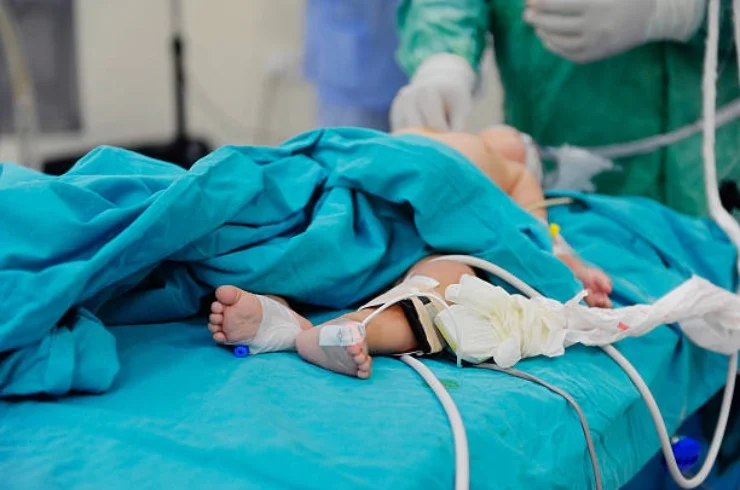Autism Spectrum Disorder
- Home
- Autism Spectrum Disorder

At Sri Baba Talli Pillala Hospital, we recognize that Autism Spectrum Disorder (ASD) is a complex neurodevelopmental condition that affects communication, behavior, and social interactions in children. Led by Dr. Satya Narayana, our compassionate team is dedicated to providing comprehensive diagnosis, support, and intervention strategies for children with ASD and their families.
Understanding Autism Spectrum Disorder (ASD)
- Definition: Autism Spectrum Disorder is characterized by a range of symptoms that impact social skills, communication, and behavior, making each child’s experience unique.
- Symptoms: Common symptoms of ASD include difficulty with social interactions, challenges in verbal and non-verbal communication, repetitive behaviors, and restricted interests.
- Early Signs: Early signs may appear in infancy or early childhood, such as delayed speech, lack of eye contact, and limited interest in social play.
- Causes: While the exact causes of ASD are not fully understood, research indicates that genetic and environmental factors may contribute to its development.
Our Autism Spectrum Disorder Services
Sri Baba Talli Pillala Hospital offers a range of specialized services to assist children with ASD and their families, including:1. Comprehensive Assessments
Our healthcare professionals conduct thorough evaluations, including developmental assessments, behavioral observations, and standardized testing, to accurately diagnose ASD and determine the child’s specific needs.2. Individualized Intervention Plans
We develop customized intervention strategies that may include applied behavior analysis (ABA), speech and language therapy, occupational therapy, and social skills training to support the child’s development and learning.3. Family Support and Education
Recognizing the importance of parent involvement, we provide resources, training, and support groups to help families understand ASD and learn effective strategies for supporting their child.4. Ongoing Monitoring and Coordination of Care
We emphasize regular follow-up appointments to monitor progress, adjust intervention plans, and ensure that families have access to the necessary resources and support throughout the child’s development.Common Challenges in Managing Autism Spectrum Disorder
- Navigating Services: Finding appropriate therapies and support services can be overwhelming; we assist families in identifying and accessing necessary resources tailored to their child’s needs.
- Communication Challenges: Children with ASD may struggle with communication; we provide strategies and tools to enhance communication skills and promote effective interactions.
- Social Integration: Facilitating social interactions and building friendships can be challenging; we offer social skills training to help children navigate social situations more effectively.
- Understanding Behavior: Families may face behavioral challenges; our team provides guidance on effective behavior management techniques and positive reinforcement strategies.

At Sri Baba Talli Pillala Hospital, we understand that ear infections are a common health concern among children and can cause discomfort and distress. Led by Dr. Satya Narayana, our experienced team is dedicated to providing comprehensive evaluation, treatment, and preventive strategies to manage ear infections effectively.
Understanding Ear Infections
- Types of Ear Infections: Ear infections in children can be classified into otitis media (middle ear infections) and otitis externa (outer ear infections, also known as swimmer’s ear).
- Symptoms: Common symptoms include ear pain, irritability, difficulty sleeping, fever, and fluid drainage from the ear. In some cases, a child may also have difficulty hearing.
- Causes: Ear infections are often caused by bacterial or viral infections, allergies, or fluid buildup in the middle ear, frequently following a cold or respiratory infection.
- Risk Factors: Factors such as age (younger children are more prone), exposure to secondhand smoke, and frequent colds can increase the likelihood of ear infections.
Our Ear Infection Services
Sri Baba Talli Pillala Hospital offers a range of services to diagnose and manage ear infections in children, including:1. Comprehensive Assessments
Our healthcare professionals perform thorough evaluations to diagnose ear infections, including physical examinations and auditory tests to assess hearing.2. Effective Treatment Options
We provide an array of treatment options based on the severity and type of ear infection, which may include antibiotics for bacterial infections, pain management strategies, and recommendations for home care.3. Preventive Strategies
Our team educates families on preventive measures to reduce the risk of ear infections, such as proper hygiene, vaccination (e.g., pneumococcal and flu vaccines), and avoiding exposure to secondhand smoke.4. Follow-Up Care
Regular follow-up appointments are essential to monitor recovery, assess hearing, and manage recurrent ear infections if they occur.Common Concerns Related to Ear Infections
- Persistent Symptoms: Some children may experience recurring ear infections; our team develops personalized plans to address underlying causes and minimize recurrence.
- Hearing Loss: Repeated infections can potentially affect hearing; we monitor hearing closely and may refer for further evaluation and treatment if necessary.
- Discomfort and Pain Management: Managing pain and discomfort effectively is crucial; we provide guidance on pain relief strategies and supportive care at home.
- Understanding When to Seek Help: We educate parents on recognizing warning signs and knowing when to seek medical attention to ensure timely intervention.

At Sri Baba Talli Pillala Hospital, we understand that asthma is a chronic respiratory condition that can significantly impact a child’s quality of life. Led by Dr. Satya Narayana, our dedicated team is committed to providing comprehensive care for children with asthma, helping families manage symptoms effectively and improve overall health.
Understanding Asthma in Children
- What is Asthma? Asthma is a chronic inflammation of the airways that leads to recurring episodes of wheezing, coughing, shortness of breath, and chest tightness.
- Common Triggers: Common asthma triggers include allergens (like pollen and dust mites), respiratory infections, exercise, cold air, and smoke.
- Symptoms: Asthma symptoms can vary widely among children and may include coughing, especially at night, rapid breathing, and difficulty sleeping due to breathing problems.
- Impact on Daily Life: Uncontrolled asthma can affect school performance and physical activities, making proper management essential.
Our Asthma Management Services
Sri Baba Talli Pillala Hospital offers a range of specialized services to effectively manage asthma, including:1. Comprehensive Assessments
Our healthcare professionals conduct thorough evaluations, including medical history reviews and diagnostic tests, to accurately assess the severity of asthma and identify triggers.2. Tailored Treatment Plans
We develop individualized asthma management plans that may include medications, inhalers, and lifestyle recommendations to help control symptoms and prevent exacerbations.3. Patient and Family Education
We provide educational resources for children and their families, teaching them about asthma management, trigger avoidance, and proper use of inhalers and medications.4. Ongoing Monitoring and Support
Regular follow-up appointments ensure that we monitor asthma control, adjust treatment plans as needed, and provide continual support for families.Common Challenges in Managing Asthma
- Identifying Triggers: Recognizing and avoiding asthma triggers can be challenging; our team assists in making individualized plans to minimize exposure.
- Medication Adherence: Ensuring consistent medication use is crucial for effective asthma management; we offer strategies to promote adherence.
- Emergency Preparedness: Educating families on recognizing asthma attacks and knowing when to seek urgent care is vital in asthma management.
- School and Activity Management: We provide guidance on how to manage asthma in school settings and during physical activities to ensure children can participate fully.

At Sri Baba Talli Pillala Hospital, we are dedicated to supporting families and children affected by Down syndrome. Led by Dr. Satya Narayana, our compassionate team is committed to providing comprehensive care, resources, and educational support to enhance the quality of life for children with Down syndrome and their families.
Understanding Down Syndrome
- Definition: Down syndrome is a genetic condition caused by the presence of an extra chromosome 21, which leads to developmental delays and distinctive physical features.
- Symptoms: Children with Down syndrome may exhibit a range of symptoms, including characteristic facial features, hypotonia (reduced muscle tone), and developmental delays.
- Associated Health Conditions: Individuals with Down syndrome may also be at an increased risk for certain medical issues, such as heart defects, hearing loss, and gastrointestinal problems.
- Early Intervention: Early diagnosis and intervention are crucial for promoting development and maximizing potential in children with Down syndrome.
Our Down Syndrome Services
Sri Baba Talli Pillala Hospital offers a range of services designed to support children with Down syndrome, including:1. Comprehensive Assessments
Our skilled healthcare professionals conduct thorough evaluations to assess developmental milestones, health conditions, and individual needs for each child.2. Interdisciplinary Care Team
We collaborate with a team of specialists—including pediatricians, speech therapists, occupational therapists, and nutritionists—to provide holistic care tailored to the unique needs of each child.3. Parent and Family Support
Recognizing the importance of family involvement, we offer support groups, educational resources, and counseling services for parents and family members to help navigate challenges and celebrate milestones.4. Educational Resources
Our team provides valuable information about Down syndrome, developmental strategies, and resources for accessing services and support at school and within the community.Common Challenges Faced by Families
- Accessing Services: Identifying and accessing appropriate educational and health services can be overwhelming; we assist families in navigating available resources.
- Emotional Support: Families may experience a range of emotions; we provide counseling and connect families with support networks to share experiences and strategies.
- Celebrating Milestones: Understanding and acknowledging developmental milestones can be different for children with Down syndrome; we help families set realistic goals and celebrate achievements.
- Long-Term Planning: Preparing for the future is essential; we offer guidance on educational, social, and vocational planning as children grow older.

At Sri Baba Talli Pillala Hospital, we understand that diabetes in children is a growing concern that requires specialized care and management. Under the guidance of Dr. Satya Narayana, our dedicated team is committed to providing comprehensive support and education to help children and their families manage diabetes effectively.
Understanding Pediatric Diabetes
- Types of Diabetes: The most common types of diabetes in children are Type 1 Diabetes, an autoimmune condition where the body does not produce insulin, and Type 2 Diabetes, often linked to obesity and lifestyle factors.
- Symptoms: Common symptoms include excessive thirst, frequent urination, fatigue, blurred vision, and unexplained weight loss. Early diagnosis is crucial for effective management.
- Health Risks: Unmanaged diabetes can lead to serious health complications, such as cardiovascular disease, nerve damage, and kidney issues, making routine care essential.
- Importance of Management: Effective management of diabetes includes monitoring blood sugar levels, administering insulin, and maintaining a healthy diet and physical activity.
Our Pediatric Diabetes Services
Sri Baba Talli Pillala Hospital offers a range of services to support children with diabetes, including:1. Comprehensive Assessments
Our healthcare professionals conduct thorough evaluations to assess each child’s condition, including their blood sugar levels, dietary habits, and lifestyle factors.2. Individualized Diabetes Management Plans
We develop personalized management plans that encompass medication (insulin or oral medications), dietary recommendations, and exercise regimens tailored to the child’s unique needs.3. Patient and Family Education
We provide educational resources for both children and their families, covering essential topics such as understanding diabetes, monitoring blood glucose levels, and managing hypoglycemia and hyperglycemia.4. Ongoing Monitoring and Support
Regular follow-up appointments are essential to assess progress, make adjustments to treatment plans, and provide continuous support to children and their families.Common Challenges in Managing Pediatric Diabetes
- Adherence to Treatment: Ensuring children adhere to their treatment plans, including insulin administration and dietary guidelines, can be challenging; we offer strategies to encourage compliance.
- Managing Blood Sugar Levels: Fluctuations can occur due to various factors; our team helps families understand how to monitor and respond appropriately.
- Emotional and Social Considerations: Children may face emotional challenges related to their condition; we provide support for coping strategies and managing social situations, such as school and peer interactions.
- Long-Term Health Monitoring: Ensuring regular check-ups and screenings for potential complications is vital; we emphasize the importance of ongoing medical care.

At Sri Baba Talli Pillala Hospital, we understand that a diagnosis of cancer in children can be incredibly challenging and emotional for families. Led by Dr. Satya Narayana, our compassionate team is dedicated to providing comprehensive care, support, and resources for children diagnosed with cancer and their families.
Understanding Pediatric Cancers
- Types of Pediatric Cancers: Children can be affected by various types of cancers, including leukemia (blood cancers), brain tumors, neuroblastoma, Wilms tumor, and lymphoma, each requiring specialized care.
- Symptoms: Symptoms can vary widely depending on the type of cancer and its location but may include unexplained weight loss, persistent fever, fatigue, pain, and unusual lumps or swelling.
- Early Detection: Early diagnosis is crucial for effective treatment and better outcomes, making awareness of symptoms and risk factors essential.
- Impact on Families: A cancer diagnosis can affect not only the child but also their family dynamics, requiring comprehensive emotional and psychological support.
Our Pediatric Cancer Services
Sri Baba Talli Pillala Hospital offers a range of specialized services to support children with cancer and their families, including:1. Comprehensive Assessments and Diagnostics
Our skilled healthcare professionals conduct thorough evaluations and advanced diagnostic tests, such as imaging studies and biopsies, to accurately diagnose the type and stage of cancer.2. Individualized Treatment Plans
We develop personalized treatment strategies that may include chemotherapy, radiation therapy, surgery, and supportive care, tailored to each child’s specific needs and cancer type.3. Multidisciplinary Care Team
Our approach involves collaboration among pediatric oncologists, nurses, social workers, dietitians, and child life specialists, ensuring holistic care throughout the treatment process.4. Family Support Services
Recognizing the emotional toll of a cancer diagnosis, we provide resources such as counseling, support groups, and educational materials to help families navigate the challenges they face.Common Challenges in Managing Pediatric Cancers
- Side Effects of Treatment: Cancer treatments can cause various side effects; our team focuses on managing these effects and maintaining the child’s quality of life.
- Education and Communication: Communicating with children about their diagnosis and treatment can be difficult; we offer guidance and resources to help families have these important conversations.
- Transitioning to Survivorship: After treatment, children may need ongoing monitoring and support; we provide resources to facilitate the transition to survivorship and address any long-term effects.
- Accessing Resources: Families may require assistance navigating healthcare systems, financial concerns, and educational support; our team connects families with appropriate resources and services.

At Sri Baba Talli Pillala Hospital, we recognize that gastrointestinal (GI) disorders in children can significantly impact their health, growth, and quality of life. Led by Dr. Satya Narayana, our specialized team is committed to providing comprehensive care, diagnosis, and treatment for various GI disorders affecting children.
Understanding Gastrointestinal Disorders
- Common Disorders: Pediatric GI disorders can include conditions such as gastroesophageal reflux disease (GERD), constipation, diarrhea, inflammatory bowel disease (IBD), celiac disease, and lactose intolerance.
- Symptoms: Symptoms may vary widely and can include abdominal pain, bloating, nausea, vomiting, diarrhea, constipation, weight loss, and changes in appetite.
- Causes: Factors contributing to GI disorders may include dietary habits, infections, allergies, anatomical abnormalities, and genetic predispositions.
- Impact on Development: Effective management of GI disorders is crucial for ensuring proper growth, nutrition, and overall health in children.
Our Gastrointestinal Disorders Services
Sri Baba Talli Pillala Hospital offers a comprehensive range of services to diagnose and manage gastrointestinal disorders in children, including:1. Comprehensive Evaluations
Our healthcare professionals conduct thorough assessments, including medical history reviews, physical examinations, and diagnostic tests (e.g., imaging studies, endoscopy) to identify the underlying causes of gastrointestinal issues.2. Individualized Treatment Plans
We develop personalized treatment strategies that may include dietary modifications, medications, behavioral interventions, and referrals to specialists when necessary.3. Nutritional Guidance
We provide dietary counseling and nutritional support to help families understand the role of nutrition in managing gastrointestinal disorders and ensuring balanced diets for their children.4. Ongoing Monitoring and Support
Regular follow-up appointments are essential for monitoring progress, adjusting treatment plans, and providing ongoing education and support to families.Common Challenges in Managing Gastrointestinal Disorders
- Adherence to Dietary Recommendations: Following specific dietary plans can be challenging for children and families; our team provides practical strategies to promote compliance.
- Emotional and Social Impact: GI disorders can affect a child’s emotional well-being and social interactions; we address these aspects through supportive counseling and resources.
- Managing Symptoms Effectively: Some symptoms may persist or fluctuate; we work closely with families to develop coping strategies and manage ongoing issues.
- Accessing Specialist Care: Complex cases may require referrals to gastroenterologists or dietitians; we facilitate access to necessary specialists and services.

At Sri Baba Talli Pillala Hospital, we understand that neurological disorders in children can profoundly affect their development, behavior, and overall quality of life. Led by Dr. Satya Narayana, our dedicated team is committed to providing comprehensive evaluation, diagnosis, and management of a variety of pediatric neurological disorders.
Understanding Pediatric Neurological Disorders
- Common Disorders: Pediatric neurological disorders can include conditions such as epilepsy, cerebral palsy, attention deficit hyperactivity disorder (ADHD), autism spectrum disorders, and neurogenetic disorders.
- Symptoms: Symptoms can vary widely depending on the specific disorder and may include seizures, delays in developmental milestones, difficulties with motor skills, behavioral challenges, and cognitive impairments.
- Causes: Neurological disorders may result from genetic factors, infections, brain injuries, or developmental abnormalities that occur during pregnancy or infancy.
- Holistic Impact: These conditions can impact various aspects of a child’s life, including educational performance, social interactions, and daily functioning, making early intervention vital.
Our Pediatric Neurological Disorders Services
Sri Baba Talli Pillala Hospital offers a range of specialized services to effectively diagnose and manage neurological disorders in children, including:1. Comprehensive Assessments
Our expert healthcare professionals conduct thorough evaluations, including neurological examinations, imaging studies (such as MRI or CT scans), and developmental assessments to accurately diagnose the condition.2. Individualized Treatment Plans
We develop personalized treatment strategies that may include medications, physical therapy, occupational therapy, behavioral therapy, and educational support tailored to each child’s needs.3. Multidisciplinary Approach
Our team collaborates with pediatric neurologists, therapists, psychologists, and special educators to create a holistic care plan that addresses all aspects of the child’s development.4. Family Support and Education
Recognizing the importance of family involvement, we offer education and resources to help families understand their child’s condition, management strategies, and available support services.Common Challenges in Managing Pediatric Neurological Disorders
- Accessing Appropriate Services: Finding suitable therapy and educational resources can be complex; we assist families in navigating these options to ensure their child receives comprehensive care.
- Emotional Well-Being: Children and families may face emotional and psychological challenges; we offer counseling services and support groups to help them cope with the social and emotional impacts of neurological disorders.
- Monitoring Progress: Ongoing evaluation of the child’s development and health is crucial; we emphasize the importance of regular follow-up appointments and adjustments to treatment plans.
- Building a Support Network: Connecting with other families and support groups can be invaluable; we provide information on local and national resources for families facing similar challenges.

At Sri Baba Talli Pillala Hospital, we recognize that managing fevers associated with anemia can be a complex and concerning experience for patients and their families. Our specialized Fevers with Anemia service, led by Dr. Satya Narayana, is tailored to provide comprehensive care, education, and support for effective management of this condition.
Understanding Fevers and Anemia
- Underlying Causes: Anemia can be triggered by various factors, including nutritional deficiencies, chronic illnesses, or infections, which may also present with fever.
- Symptoms: Common symptoms include fatigue, weakness, pallor, and fever, requiring thorough assessment and monitoring.
- Prompt Diagnosis: Timely identification of the causes of fever and anemia is crucial for appropriate treatment and recovery.
- Comprehensive Care: Our holistic approach ensures that both conditions are addressed simultaneously for optimal health outcomes.
Our Fevers with Anemia Services
Sri Baba Talli Pillala Hospital offers a range of services to effectively manage fevers and anemia, including:1. Comprehensive Assessments
Our healthcare team conducts thorough evaluations to identify the underlying causes of fever and anemia, ensuring accurate diagnosis.2. Tailored Treatment Plans
We develop individualized treatment plans that may include dietary recommendations, supplementation, and medications to address the root causes of your symptoms.3. Patient Education
We provide valuable resources and guidance to help patients and families understand anemia and fever management, empowering them to take an active role in their health.4. Follow-Up Care
Ongoing monitoring is essential for effectively managing chronic conditions. Our team offers regular follow-up appointments to track progress and adjust treatment as needed.Common Challenges in Managing Fevers and Anemia
- Identifying Symptoms: Distinguishing between fever-related symptoms and anemia can be challenging; our experts help navigate these complexities.
- Treatment Compliance: Adhering to treatment regimens can be difficult; we provide support and education to enhance compliance.
- Nutritional Needs: Addressing dietary deficiencies is crucial; our team offers personalized nutritional counseling.
- Ongoing Monitoring: Regular check-ups are vital to ensure effective management; we emphasize the importance of follow-up care.

At Sri Baba Talli Pillala Hospital, we understand that blood transfusions can be critical for patients requiring immediate and effective treatment for various medical conditions. Our dedicated team, led by Dr. Satya Narayana, is committed to providing safe, efficient, and compassionate blood transfusion services.
Understanding Blood Transfusions
- Purpose: Blood transfusions are essential for replenishing blood volume in patients experiencing severe anemia, trauma, surgery, or other medical conditions.
- Components: Transfusions may involve red blood cells, platelets, plasma, or clotting factors, depending on the patient’s specific needs.
- Safety Measures: We prioritize patient safety by adhering to strict protocols for blood testing, matching, and administration.
- Rapid Response: Our team is equipped to respond quickly in urgent situations, ensuring timely access to critical care.
Our Blood Transfusion Services
Sri Baba Talli Pillala Hospital offers a range of services related to blood transfusions, including:1. Comprehensive Assessment
Our healthcare professionals conduct thorough evaluations to determine the need for a blood transfusion, considering the patient’s medical history and current condition.2. Safe Blood Administration
We utilize advanced techniques and equipment to ensure that blood transfusions are administered safely and effectively, minimizing any potential risks.3. Monitoring and Support
Patients receiving blood transfusions are closely monitored throughout the process to detect any adverse reactions, and our team is on hand to provide immediate support if needed.4. Education and Counseling
We offer educational resources to help patients and their families understand the transfusion process, including potential benefits and risks, to empower informed decision-making.Common Concerns Related to Blood Transfusions
- Allergic Reactions: Some patients may experience allergic reactions during transfusions; our team is trained to manage such events effectively.
- Transfusion Reactions: Rarely, patients may face complications; we focus on prevention and rapid response to any signs of issues.
- Informed Consent: We ensure that patients are fully informed and consent to the procedure, understanding its purpose and implications.
- Availability of Blood Products: Our facility maintains a sufficient supply of safe blood products through partnerships with blood banks and donation drives.

At Sri Baba Talli Pillala Hospital, we recognize that allergies can significantly impact quality of life and overall health. Led by Dr. Satya Narayana, our dedicated allergy service is designed to provide comprehensive evaluation, diagnosis, and management for individuals experiencing allergic reactions and sensitivities.
Understanding Allergies
- What are Allergies? Allergies occur when the immune system overreacts to substances known as allergens, which can include food, pollen, pet dander, and more.
- Symptoms: Common allergic reactions may manifest as sneezing, itching, hives, digestive issues, or in severe cases, anaphylaxis.
- Diagnosis: Accurate diagnosis is crucial for effective management, and our team utilizes a variety of tests to identify specific allergens.
- Management Plans: We develop individualized management plans aimed at minimizing exposure to allergens and managing symptoms effectively.
Our Allergy Services
Sri Baba Talli Pillala Hospital offers a range of services to help manage allergies, including:1. Comprehensive Allergy Testing
Our specialists perform skin and blood tests to identify allergens responsible for triggering reactions, allowing for targeted management strategies.2. Personalized Treatment Plans
Based on test results and individual patient needs, we create tailored treatment plans that may include medications, allergy shots, or lifestyle adjustments.3. Education and Resources
We provide valuable information and resources to help patients and their families understand allergies, recognizing symptoms, and avoiding potential triggers.4. Emergency Response Procedures
For patients with a history of severe allergies, we establish emergency action plans, educating patients and families on how to respond quickly in case of severe reactions.Common Allergic Reactions and Concerns
- Food Allergies: Reactions to specific foods can vary significantly; we offer guidance on managing food allergies effectively.
- Environmental Allergies: Seasonal and indoor allergens can exacerbate symptoms; our team provides strategies for mitigation and relief.
- Medication Allergies: Understanding sensitivity to medications is crucial; we monitor and offer alternative solutions when necessary.
- Anaphylaxis: In cases of severe allergic reactions, immediate intervention is critical; we emphasize education on recognizing this life-threatening condition.

At Sri Baba Talli Pillala Hospital, we understand that the journey of parenthood begins with the arrival of your newborn. Our dedicated Newborn Care service, led by Dr. Satya Narayana, is designed to provide comprehensive care and support to ensure the health and well-being of your little one during this crucial stage of development.
Understanding Newborn Care
- Importance of Newborn Care: The first weeks of life are vital for your baby’s health, as they undergo significant physical and developmental changes.
- Routine Assessments: Regular check-ups are essential to monitor growth, development, and overall health, ensuring timely interventions if needed.
- Parental Education: Equipping parents with knowledge about newborn care practices can lead to better outcomes for both infants and families.
- Supportive Environment: Creating a nurturing atmosphere is crucial for a newborn’s emotional and physical well-being.
Our Newborn Care Services
Sri Baba Talli Pillala Hospital offers a range of services to provide exceptional care for newborns, including:1. Comprehensive Newborn Assessments
Our pediatric team conducts thorough evaluations of your newborn’s health, including physical examinations, growth monitoring, and screening for any congenital conditions.2. Individualized Care Plans
We tailor care plans based on your newborn’s specific needs, ensuring they receive personalized attention and any necessary interventions.3. Breastfeeding Support
Our experts provide guidance and support to help mothers establish and maintain breastfeeding, addressing any challenges that may arise.4. Parental Guidance and Resources
We offer educational resources and workshops for new parents, covering topics such as feeding, sleeping, immunizations, and newborn care best practices.Common Newborn Concerns
- Feeding Issues: Many parents encounter challenges with feeding; we provide strategies and support to address these concerns.
- Jaundice: Monitoring and managing jaundice is essential; our team offers assessments and treatments for newborns presenting symptoms.
- Sleep Patterns: Understanding newborn sleep behaviors is vital; we offer tips for establishing healthy sleep routines.
- Growth and Development: Regular monitoring ensures that your baby is meeting important milestones, allowing for timely support if required.

At Sri Baba Talli Pillala Hospital, we recognize that experiencing seizures can be a distressing and life-altering event for both patients and their families. Under the expert guidance of Dr. Satya Narayana, our comprehensive Seizure Care service is dedicated to providing thorough evaluations, effective management, and ongoing support for individuals facing seizure disorders.
What Are Seizures?
- Definition: Seizures are sudden, uncontrolled electrical disturbances in the brain that can lead to changes in behavior, movements, feelings, or consciousness.
- Types of Seizures: There are various types of seizures, including focal, generalized, and absence seizures, each with distinct characteristics and implications.
- Symptoms: Symptoms can range from brief lapses in attention to full-body convulsions, and recognizing these signs is essential for prompt intervention.
- Impact: Seizures can affect daily life, including learning, work, and social interactions, making comprehensive care crucial.
Our Seizure Management Services
Sri Baba Talli Pillala Hospital provides an extensive range of services to ensure effective management of seizure disorders:1. Comprehensive Diagnosis
Our team conducts detailed evaluations, including neurological assessments, imaging studies, and EEG monitoring to accurately diagnose the type and cause of seizures.2. Tailored Treatment Plans
We create individualized treatment plans that may incorporate medication management, lifestyle modifications, or referrals to specialists, aimed at minimizing seizure frequency and severity.3. Education for Patients and Families
We provide valuable resources and counseling to educate patients and their families about seizures, triggers, and emergency response protocols. This empowers them to manage the condition effectively.4. Continuous Monitoring and Follow-Up
Ongoing care is essential for individuals with seizure disorders. Our team schedules regular follow-ups to monitor progress, assess treatment efficacy, and make necessary adjustments.Common Questions and Concerns
- Seizure Triggers: Identifying potential triggers is crucial for effective management; we work with patients to recognize and avoid these factors.
- Safety Precautions: Understanding safety measures during a seizure is vital; our experts guide families on how to ensure safety for individuals experiencing seizures.
- Medication Management: Adherence to prescribed treatment regimens is essential; we provide support and resources to assist patients in managing their medications.
- Emergency Response: We emphasize the importance of knowing how to respond during a seizure event to ensure the safety and well-being of the individual.

At Sri Baba Talli Pillala Hospital, we recognize that pediatric emergencies require immediate and specialized care. Our dedicated team, led by Dr. Satya Narayana, is committed to providing rapid, effective, and compassionate treatment for children facing medical crises.
Understanding Pediatric Emergencies
- Types of Emergencies: Pediatric emergencies can include respiratory distress, allergic reactions, fever-related complications, trauma, and more, requiring prompt assessment and intervention.
- Unique Needs: Children have different physiological responses than adults, necessitating specialized protocols and care approaches tailored specifically for their age and development.
- Rapid Response: Our emergency team is trained to recognize and act swiftly in urgent situations, providing lifesaving interventions when every second counts.
- Family-Centered Care: We prioritize the emotional needs of both children and their families, ensuring that caregivers are involved and informed throughout the emergency process.
Our Pediatric Emergency Services
Sri Baba Talli Pillala Hospital provides comprehensive services for managing pediatric emergencies, including:1. Immediate Assessment
Our skilled healthcare providers perform rapid assessments to evaluate the child’s condition and determine the necessary course of action.2. Advanced Treatment Protocols
We utilize evidence-based protocols tailored to pediatric patients, ensuring that each child receives the most effective and appropriate treatment.3. Continuous Monitoring
Children receiving emergency care are closely monitored to detect any changes in their condition and to adjust treatments as needed.4. Coordination with Specialists
If specialized care is needed, our emergency team coordinates with pediatric specialists to ensure comprehensive management of the child’s condition.Common Pediatric Emergency Situations
- Respiratory Distress: Conditions such as asthma attacks or severe allergic reactions can require immediate attention and intervention.
- Injuries and Trauma: From fractures to lacerations, prompt evaluation and treatment are essential for minimizing complications.
- High Fever and Seizures: Fevers in children can escalate quickly, and our team is skilled in managing febrile seizures and related concerns.
- Vomiting and Dehydration: We address severe vomiting and dehydration situations, providing necessary fluids and supportive care.

At Sri Baba Talli Pillala Hospital, we recognize that childhood obesity is a significant public health concern that can lead to serious health complications. Under the guidance of Dr. Satya Narayana, our dedicated team is committed to providing comprehensive evaluation, education, and management for children affected by obesity.
Understanding Childhood Obesity
- Definition: Childhood obesity is defined as having an excess amount of body fat that negatively impacts a child’s health and well-being.
- Causes: Contributing factors include poor dietary habits, lack of physical activity, sedentary behaviors, genetics, and environmental influences.
- Health Risks: Obesity in children can lead to serious health issues, such as type 2 diabetes, hypertension, sleep apnea, and psychosocial challenges.
- Long-Term Effects: Children with obesity are at a higher risk for carrying their weight issues into adulthood, making early intervention crucial.
Our Childhood Obesity Management Services
Sri Baba Talli Pillala Hospital offers a range of services to effectively address childhood obesity, including:1. Comprehensive Assessments
Our healthcare professionals conduct thorough evaluations that include measuring BMI, assessing dietary habits, and understanding physical activity levels and lifestyle factors.2. Personalized Treatment Plans
We develop individualized weight management plans that encompass dietary guidance, exercise recommendations, and lifestyle modifications to promote healthy habits and achieve sustainable weight loss.3. Family Involvement
Recognizing that family support is critical, we engage parents and guardians in the process, equipping them with tools and resources to foster a healthy home environment.4. Educational Resources
We provide educational materials on nutrition, physical activity, and healthy behaviors, empowering families to make informed choices to combat obesity.Common Challenges in Managing Childhood Obesity
- Behavioral Changes: Changing eating and activity habits can be difficult; our team provides strategies to encourage gradual, sustainable changes.
- Emotional Well-Being: Addressing the emotional aspect of obesity, including body image issues and self-esteem, is essential in our approach.
- School and Social Influences: Helping children navigate peer pressure and unhealthy food options in school settings is a key focus of our support.
- Consistency and Motivation: Maintaining motivation can be challenging; we offer ongoing support and encouragement to help families stay committed to their goals.
